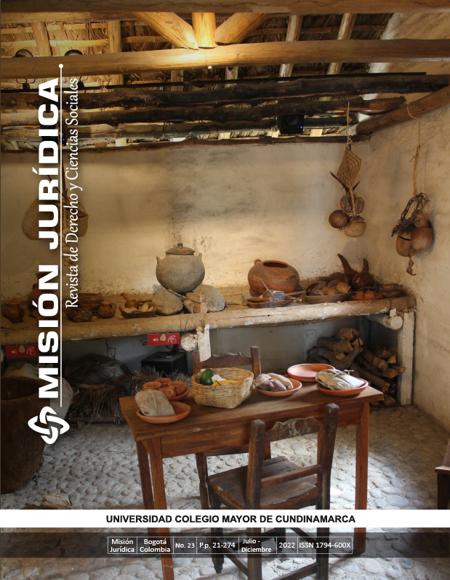Argument and narrative in the evidence context : critical dialectical study on the Hybrid Formal Theory of Arguments and Stories and the antecedent theories that deal with evidence in criminal proceedings
Argumento y narrativa en el contexto de la prueba : estudio crítico dialéctico sobre la Hybrid Formal Theory of Arguments and Stories y las teorías antecedentes que tratan sobre la prueba en el proceso penal
COPYRIGHT PROVISIONS
Every papper included in the magazine can be reproduced whole or in part, provided that respect for its original content, the source is acknowledged and is used with non-commercial academic. Legal mission and its content is protected under a license Creative Commons Attribution-Noncommercial-

Misión Jurídica is distributed under a Creative Commons Attribution-NonCommercial-NoDerivar 4.0 International License.
Based on a work in http://unicolmayor.edu.co/publicaciones/index.php/mjuridica/index.
Permits that go beyond what is covered by this license can be found at http://unicolmayor.edu.co/publicaciones/index.php/mjuridica/index.
Show authors biography
In this work I seek to investigate the use of arguments and narratives within the scope of theories that deal with the question of evidences, specifically in the Story Model, the Anchored Narratives Theory and the Hybrid Formal Theory of Arguments and Stories. I question whether the normative-instrumentalized verification process of evidence, formulated in hybrid theory, meets the need to treat the evidence in order to identify the nature of the imputation of the crime committed by the agent. I argue that the hybrid theory does not address the question of proof as to the nature of the imputation of the agent's criminal liability, which is it does not seek to identify whether the criminal fact was perpetrated by way of intention or recklessness. I conclude adducing that the hybrid theory does not meet the need to treat the evidence to identify the nature of the imputation of the crime committed by the agent.
Article visits 142 | PDF visits 129
Downloads
- Anderson, T.J., Schum, D. A. and Twining, W. L. Analysis of Evidence, 2nd edition, Cambridge University Press, Cambridge, 2005.
- Aroso Linhares, Jose Manuel, Evidence (or Proof) as Law's Gaping Wound: A Persistent False Aporia, 88 Bol. Fac. Direito U. Coimbra 65, 2012.
- Bennett, W. Lance, and Feldman, Martha S. Reconstructing reality in the courtroom: Justice and judgment in American culture. New Brunswick (NJ): Rutgers University Press, 1981.
- Bentham, Jeremy. ‘The Rationale of Judicial Evidence, Specially Applied to English Practice’, in The Works of Jeremy Bentham, ed. J. Bowring, vols VI–VII. Edinburgh: Tait.: 1827, 1838–43.
- Bex, Floris J. Arguments, Stories and Criminal Evidence. A Formal Hybrid Theory, Dordrech, Springer, 2011.
- Bex, Floris J. e Verheij, Bart van. Story schemes for argumentation about the facts of a crime. Proceedings of the 2010 AAAI Fall Symposium on Computatonal Narratives. AAAI Technical Report FS-10-04, AAAI Press, Menlo Park CA. 2010.
- Bex, Floris J. Evidence for a Good Story: A Hybrid Theory of Arguments, Stories and Criminal Evidence. Doctoral dissertation, Faculty of Law, University of Groningen: 2009.
- Bex, Floris J.; Koppen, Peter J.; Prakken, Henry; Verheij, Bart van. A Hybrid Formal Theory of Arguments, Stories and Criminal Evidence. Article in Artificial Intelligence and Law. June 2010.
- Bex, Floris J.; Prakken, Henry; Verheij, Bart van. Anchored Narratives in Reasoning about Evidence. Legal Knowledge and Information Systems - JURIX 2006: The Nineteenth Annual Conference on Legal Knowledge and Information Systems, Paris, France, 7-9 December 2006.
- Boer, Monica Den. Anchored Narratives. In International Journal for the Semiotics of Law Vol. VIII no. 24, 327 – 334, 1995, p. 327. https://bit.ly/3xlRLSP.
- Calheiros, Maria Clara. Para uma teoria da prova. 1st ed. Coimbra: Coimbra Editorial, 2015.
- Canzio, Giovanni; Taruffo, Michele; e Ubertis, Giulio. Fatto, prova e verità (alla luce del principio dell’oltre ogni ragionevole dubbio). Opinioni a Confronto. In Criminalia (2009): 2018. https://bit.ly/3pOM11K.
- Haldar, Piyel. The evidencer's eye: representations of truth in the laws of evidence. Law and Critique. Vol. II no.2 1991. https://bit.ly/3pNykzY.
- Hamilton, David. From Dialectic to Didactic. Umeå University Sweden, 2001. https://bit.ly/3crKby0.
- Martins, Argemiro Cardoso Moreira; Roesler. Cláudia Rosane; Jesus, Ricardo Antonio Rezende de. A noção de coerência na teoria da argumentação jurídica de Neil Maccormick: caracterização, limitações, possibilidades. Revista Novos Estudos Jurídicos. vol. 16, no. 2 (2011). https://doi.org/10.14210/nej.v16n2.p207-221.
- Matida, Janaina; Nardelli, Marcella Mascarenhas; & Herdy, Rachel. A prova penal precisa passar por uma. Revista Consultor Jurídico, 13 de março de 2020, 8h00, p. 2. https://bit.ly/3pSrWYk.
- Moss, Ann. Printed Commonplace-Books and the Structuring of Renaissance Thought. Oxford: Clarendon Press. 1996.
- Pennington, N., & Hastie, R. Reasoning in explanation – based decision making. Cognition 49:1–2, 1993a, 123–163.
- Pennington, N., & Hastie, R. The story model for juror decision making. In R. Hastie (Ed.), Cambridge series on judgment and decision making. Inside the juror: The psychology of juror decision making (pp. 192–221). Cambridge University Press. 1993.
- Pereira, Rui Soares. Modelos de prova e prova da causalidade. In Juízo ou decisão? O problema da realização jurisdicional do Direito. VI Jornadas de Teoria do Direito, Filosofia do Direito e Filosofia Social. Universidade de Coimbra, 2016, pp. 447-483.
- Silva, Pedro Vinícius Ribeiro da. A dimensão narrativa da prova no âmbito do processo penal brasileiro. Monografia de final do curso de Direito. UFRJ: 2017.
- Taruffo, Michele. A prova. São Paulo: Marcial Pons, 2014.
- Twining, William L. Bentham’s Theory of Evidence: Setting a Context. Journal of Bentham Studies, volume 18. https://doi.org/10.14324/111.2045-757X.047.
- Twining, William L. Theories of Evidence: Bentham and Wigmore. London: Butler & Tunner Ltd., 1985, p. 14.
- Verheij, Bart. Anchored narratives and dialectical argumentation. Department of Metajuridica, Universiteit Maastricht. P.O. Box 616, 6200 MD Maastricht, The Netherlands. 2001. https://bit.ly/3vpVPA7.
- Wagenaar, W. A.; Van Koppen, P. J.; e Crombag, H. F. M. Anchored Narratives: The Psychology of Criminal Evidence, St. Martin's Press, New York: 1993.
- Wigmore, John Henry. The science of proof: as given by logic, psychology and general experience and illustrated in judicial trials. Boston: Little, Brown & Company, 1937.
















